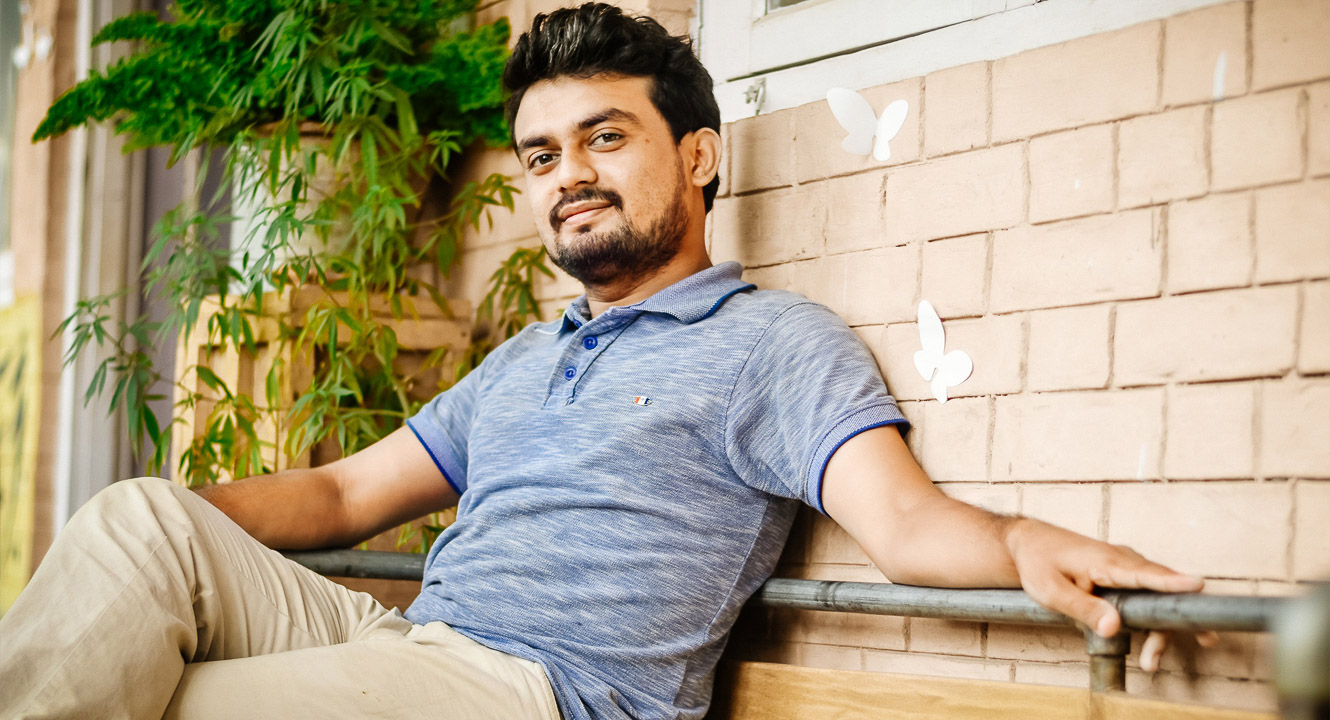SOCIAL CHANGEMAKERS BLOG SERIES ISSUE NO 1: Saroj Karki, Founder Youth For Blood- Be the changemaker, not the trouble maker
People say social work is tricky. More often it comes as a burden after some time or it starts to be a means of living. As a result, many social initiatives could not last long for more than 3 years. However, there is one exception with Youth for Blood, a pure volunteering based organization, which recently celebrated its sixth anniversary and is serving people from 5 different places in Nepal. It has more than 200 active volunteers who serve by heart and influence thousands other. How does a social initiative run and how is the condition of social service in Nepal? We asked these questions to Mr. Saroj Karki, founder of Youth for blood and OB Media and one of the most well-known youth activists from Biratnagar.
What does youth for blood do? How was it started?
Youth for blood facilitates the blood and serves the needy people. We receive calls from the patient, call blood donors from our list and connect them. We aim to make this country blood scarcity free and to achieve that goal, we have realized that blood facilitation was not enough. Therefore, we have started doing blood awareness campaigns to encourage people to become new donors as well. We encourage people to not donate blood only one time but on a regular basis.
How did you become a youth activist? What did you do before in your life?
Before coming an activist, I was working to earn money. Uplifting my personal economic status was my main goal. I used to work from 5 am to 12 pm every day. This learning phase of life, which I call this phase now, was dedicated to earning money. In other words, I was killing my social side. I used to give tuition to small students and that was the only occasion where I could socialize.
One day my classmates called me and said he is searching for B+ blood for his mama’s operation. A few days before, my college had organized a blood donation program and I had donated my blood as well. Hence, I knew some of the blood groups of my friends. I called them for help, but nobody came. Some of them denied coming whereas some refused to name their blood group. That was a tragic experience. Meanwhile, when going to office, I found a friend named Dasharatha Shah, who agreed to donate. The operation went successfully. It was a great feeling to save someone’s life. The way they thanked me was overwhelming. That incident gave me something, which I never thought of achieving. I knew what true satisfaction was.
After that incident, many things came to my mind. Next day, I visited the blood bank and found the conditions were not good. Many people from neighboring districts were waiting for the blood. Some of them were calling people listed in their general register, but no one of them was responding positively. I tried to help them, but could not do it. More people approached me searching for help. I was alone. Then I realized the condition was worse than I actually thought it was.
That night, the Youth for blood’s concept came to my mind, and I shared my idea with some people attending a program next day. Out of 60+ people, only 6 people agreed to my plan of forming a youth network where people could call for help. They led the journey, which I am narrating to you now.
What are the challenges being in this field?
We knew we wanted to do something good, but finding the right way to do it was difficult. We were putting efforts everywhere. For some months, it was fine but gradually motivation, became as a problem. People easily come, but it is hard to keep their motivation going.
In terms of finding blood donors, it was difficult to find people. People say yes first and no at the last moment. They don’t know the condition of people undergoing surgery and in need of blood, until they are experiencing it themselves or are personally affected by it.
None of us were familiar with management, so internal member management was a big challenge. It was just like let’s do a thing, but without a proper plan and vision. We used to participate in every program possible even when organizers used to call us as a gap filler to their programs. We were happy doing that.
Another challenge we experienced is that not all people have similar thinking. Over the course of time, many people with different motivations came and it was difficult to recognize and select the right from the wrong people.
Another challenge was people’s perception towards us. They had doubt how long we could survive. Some of them even blamed us for doing something for monetary benefit. Later we understood that every social initiative has the same experience.
How is your initiative creating impact to the social landscape of Nepal?
Firstly, we are saving people’s lives. Connecting people through blood beyond any social, ethnic, and religious differences is a great contribution to our society. This has contributed to promoting social harmony. Also, our initiatives make people more conscious of human values.
Many people are interested in social work, which is an admirable thing. And those youths who are engaged in social work are doing something positive for society, instead of being caught up in the negative things about Nepal and not doing anything about them. Our volunteers are at least learning good social behavior and responsibility. If you look at the recent social organizations in Biratnagar, most of their leaders were once Youth for blood volunteers.
What are the challenges for a single person to be in the social field?
Parents will be happy if their children are playing Carrom at Chowk, but not if they are involved in any social initiative. They think being in the social sector means leaving other things you’re your study or job. Answering them back is not an easy task. To gain support from inside your own circles is a challenging part.
You said you left your job to start youth for blood. Later you started OB Media which is a privately-owned company? What encouraged you to make that shift?
I say to everyone that I accidentally became a social activist. When I saw the conditions at the blood donation banks, I could not escape. My early interest was in the IT and Media sector, which used to thrill me. For social activism, I left many things. I left some good job offers. My earning stopped. It was a hard time. There were other volunteers around me who also became like me and the list was growing. It was helping us to establish our name as an organization, but did not provide income needed to support ourselves.
I think by leaving everything for social activism, I set a wrong example and I felt that nobody should do the same. So, we encouraged our volunteers to see first look after themselves, their families, study and then only the social work. I think that is the right model we should adopt. If social work ruins your study and family, then there is no difference between social work and gambling.
Setting a good example was important to me. Therefore, me with other some volunteers of Youth for Blood started OB Media. Now we have 7 full-time employees and we are starting to earn. Now we are working with bigger and well-known brands of Nepal.
Meanwhile in the social field, what are the things you have achieved?
The biggest thing is people now believe that Saroj Karki won’t do anything wrong to society. That is a great honor for me. And talking about Youth for blood and OB Media, both of them are setting good examples. People believe in Youth for blood and it’s been six years, we are surviving without taking any external donations. There is good volunteer flow and it is growing. In terms of OB Media, we are happy to employ 5 people and serve the local level people by carrying out our responsibility to provide information to the general public. We are promoting civic journalism and connecting thousands of people, who are interested in their local news. We proudly say, ‘we are connecting Biratnagar to the world.’
What problems do you see overall with social organizations in Nepal?
The major problem is that many of them are only existing for reporting purposes. We have seen that during an earthquake and flood. They are paying 2000 taxi fare to distribute goods worth of Rs.1000. This trend should be stopped.
Nowadays there are various colleges which teach social work. Should the students reading social work start their own organization?
I don’t think they should. As per my experience, we don’t lack any social workers now. What we lack is experts on social work, who can change the way we are thinking of social work. Those who study social work learn various management skills related to social work. They should try to convert those skills in to helping existing organization change and become more professional. That would be a huge contribution.
You are also the member of US Embassy Youth Council and gained a fellowship in America as well. How do you see the difference in terms of what we are doing and is being done in the US in terms of youth activism?
There is not much difference. The social work spirit is the same. The major difference I observed is that the US government is very supportive of the social work being carried out by its citizens. This is somehow lacking in Nepal. The government here sees social initiatives as a challenge to their work. This is may be because we tend to blame the government in most of the cases. I think we should be complimentary to each other and both government and social initiative should focus on working together.
What suggestions do you have for other young people?
Due to our busy lives, our time to volunteer is very limited. Therefore, you should do things while you are studying and it will pay you in the long run. When you are surrounded by your family, you will have many responsibilities and it will be difficult to find the time to volunteer.
Finding the right person for the right work is what we need. Serve the field which you know best. What I see is that people are attracted to positions that others praise immediately. Don’t go for that. People also love gradual change. If you want to be a social activist, first be clear on the field in which you want to bring change. Ask what your issue is and ask does that issue really need change? Are you the right person to bring that change? Coming prepared is always the best option. There are problems everywhere, but you can’t change everything. Chose an issue and bring a visible change.
Be the change maker, not the trouble maker. Make sure that by trying to solve a problem, you should don’t become the problem of the society in the name of social initiative. Connect with other organizations who are working in a similar field. Together you can achieve more!
If you are impressed with Saroj Karki’s thoughts and want to get connected with Youth for Blood, the following links can help you.
Youth for Blood:
Website: www.youthforblood.org
Facebook: www.fb.com/youthforbloog
Twitter: @youthforblood
OB Media
Website: www.ourbiratnagar.net
Facebook: www.fb.com/ourbrt
Twitter: @ourbiratnagar


